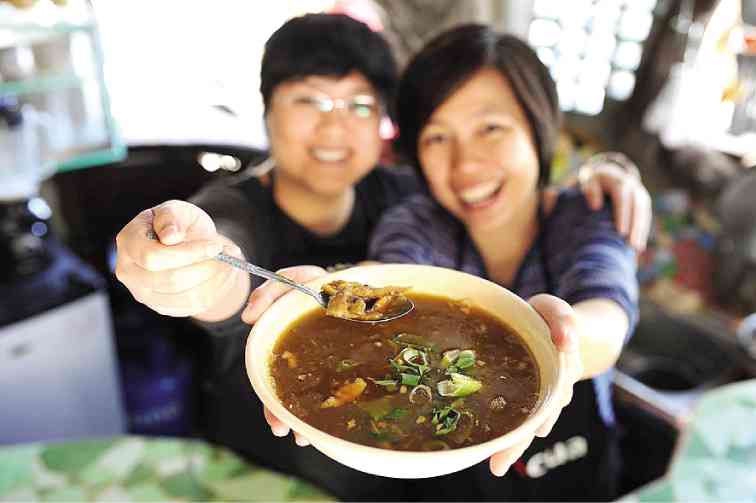Young entrepreneurs bring signature southern soup to hilly, chilly North

Kathryn Yap and Grace Calleja, current proprietors of Urban Kamote in Baguio City, have successfully introduced the dish, balbacua, to the Baguio crowd. The dish is popular in the Visayas and Mindanao. EV ESPIRITU/INQUIRER NORTHERN LUZON
BAGUIO CITY—Northern Luzon’s signature dishes are the most familiar stews in the summer capital: There’s “bulalo,” “pinapaitan” and “sinanglaw.”
A young couple, however, thinks the city may be ready for a dish developed in southern Mindanao.
Urban Kamote’s Grace Calleja, 43, and Kathryn Yap, 28, have won over repeat customers who crave their “balbacua”—a soup of beef skin and meat slow-cooked in herbs for six hours.
That soup contains the couple’s success story.
Calleja has been in the food business since 2003 and is operating a side business at a university here. A native of Manila, she also worked as a volunteer for the lifestyle advocacy group, Movement of Imaginals for Sustainable Societies through Initiatives, Organization and Network (Mission), where she met Yap in 2012.
Yap, a native of Koronadal City, said she used to work for her family, which has interests in a bus company and a telephone and Internet service provider.
“I decided to leave and start my own business, even if it was small. I worked my own multimedia designing for applications and games for clients abroad,” Yap said.
The two were inspired to develop their own source of livelihood, which was the solution to a rather basic question.
“We thought ‘bulaluhan’ was common already, so why not bring ‘balbacua’ to Baguio City?” Calleja asked, noting how the ‘balbacuahan’ caught her attention after visiting Koronadal and other places in Mindanao.
“We thought it would be a hit here because of the cold weather,” she explained.
The opportunity to develop the business came when proprietors of Urban Kamote left for Germany and asked the couple to operate it. The food stall is part of the Ili-Likha Artist Village—an art space and health food establishment built by filmmaker Kidlat Tahimik on Assumption Road here.
On July 1 last year, when she turned 28, Yap opened “Balbacua at Urban Kamote.”
Both Yap and Calleja found themselves promoting the specialty soup to passersby on busy Assumption Road.
A bowl of the dish costs P55, and may be partnered with a serving of red rice, misua or special noodles for an additional P15, or fried saba or quail eggs for P10.
Balbacua is cooked at the couple’s kitchen in Happy Hallow village inside the forest reservation of Camp John Hay here.
Calleja said versions of balbacua in other places use tomato sauce, soda, and pork and beans. “But we wanted ours to be natural [because] we wanted it to taste like the one served in Koronadal.”
The food stall serves an all-day breakfast menu of red rice, free range brown egg and a choice of grass-fed beef burger patty, pasture-raised pork sausages, and free-range smoked bacon.
The meat they serve are organic products sourced from Bukidnon, Yap said.
“I enjoy being on my own for it allows me to be creative about [finding] solutions. Even with limited resources, it helps me to think of opportunities,” Yap added.
Calleja said that she found it hard to be motivated everyday.
“But you have to have a system in place… [You have] to be consistent and keep the business going,” she said.
Yap’s advice to aspiring young entrepreneurs: “Don’t be afraid of hardship, it is a rite of passage that everyone has to go through. Do not limit yourself to one opportunity. Do not be afraid to try new things. Follow your curiosity [because it will allow you] to follow [your] passion.”